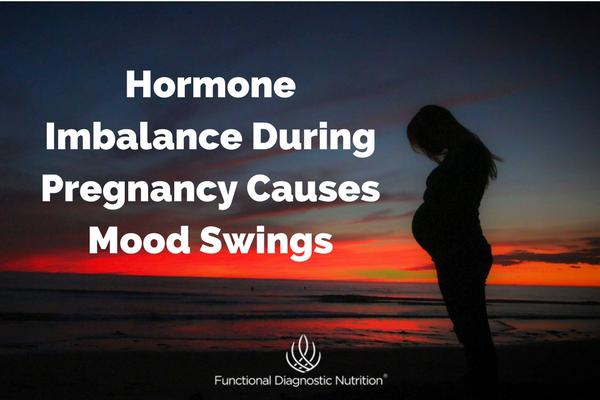Most women experience mood swings during pregnancy. But why does this happen? And how can symptoms be eliminated? Mood swings are also a common symptom of PMS. In both cases, a hormone imbalance is the most common cause. Unfortunately, hormone imbalance is quite common. And unhealthy habits that today’s lifestyle promotes are typically to blame.
Female Hormone Imbalance
The major hormones involved in menstruation and pregnancy are estrogen and progesterone. In general, estrogen promotes tissue growth and progesterone regulates it. When an imbalance between these hormones develops, serious problems can result.
Low progesterone has become the most common form of hormone imbalance in women. It typically results in a condition called “estrogen dominance.” Even if estrogen levels are normal, they’ll still be high in relation to the low level of progesterone. This can cause mood swings, breast soreness, migraines, irregular periods, water retention, weight gain and much more. If left untreated, it can lead to fibroids, infertility, endometriosis, cancer, heart disease and stroke.
Production of both estrogen and progesterone dramatically increases during pregnancy. As a result, the severity of estrogen dominance can increase if the body is not able to meet the increased demand for progesterone. In extreme situations, this can even result in miscarriage.
What Causes the Imbalance?
The hormone pregnenolone creates progesterone. Cholesterol creates pregnenolone. Cholesterol has been demonized in the media and so we’ve come to fear cholesterol in the diet. Because of this, many people follow a low fat and low cholesterol diet. This deprives them of the materials needed to create important hormones like progesterone. Also, the brain and nervous system require cholesterol to function. Because of this, the body will always sacrifice hormone production to send cholesterol to these vital areas of function instead.
Exposure to xenoestrogens and phytoestrogens also plays a role in estrogen dominance. Xenoestrogens and phytoestrogens come from both chemical and plant-based sources. Both substances act like estrogen in the body. Plastics, pesticides, and other agricultural chemicals contain xenoestrogens. Soy products contain phytoestrogens. Eating organic food and avoiding storing food or water in plastic helps to reduce exposure to xenoestrogens. Avoiding soy reduces exposure to phytoestrogens.
The Contribution of Stress
Stress contributes to the majority of chronic illness. It also contributes to progesterone deficiency. Progesterone comes from cortisol, the body’s primary stress and anti-inflammatory hormone. Chronic exposure to stress will greatly reduce the availability of progesterone for other purposes. And common sources of chronic inflammation such as infection and food sensitivities will do the same.
Many of us live with excessive stress. Many eliminate saturated fat and cholesterol from their diets, eat conventionally farmed foods coated with chemicals, and unknowingly eat foods to which they are sensitive. In fact, this often occurs on a daily basis. Each of these things can cause estrogen dominance. And modern society promotes all of them!
Finding Balance
Can eating specific foods resolve all of this? While diet is part of the solution, it’s far from being the complete solution. Searching for a particular food or supplement to resolve a specific problem is nothing more than a natural form of chasing symptoms. The solution to all health problems begins with living a lifestyle that includes healthy food, appropriate exercise, quality sleep and regular stress management.
Because cholesterol is a precursor to many essential hormones, we must get past the fear that dietary cholesterol and saturated fat cause heart disease. A few good sources of saturated fat and cholesterol include beef, pork, butter, ghee, and eggs. Be sure to get these foods from quality sources. And consider following the Metabolic Typing Diet to understand what foods would be best for each person.
For some with chronic cases of hormone imbalance, lifestyle changes won’t be enough. When too much progesterone is used to produce the cortisol needed to handle frequent stress and inflammation, additional support may be needed. This is because the body’s preferred pathways of hormone creation can become altered. When this happens, lifestyle improvements are still necessary, but often not enough.
Supplementation of bio-identical hormones is often needed to re-establish the proper pathways. However, for this to happen, any existing food sensitivities or chronic infections must be addressed. For this type of treatment to be effective, and safe, proper testing is absolutely essential.
Interested in learning how you can test hormone levels with your clients? The FDN Certification Course can show you how! Learn how to run tests and to look for subtle patterns of dysfunction that doctors often miss. This allows you to create holistic protocols for your clients that are targeted to their needs.







